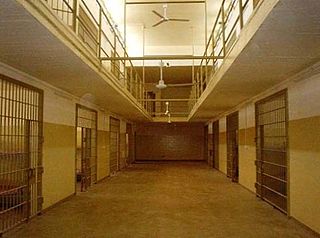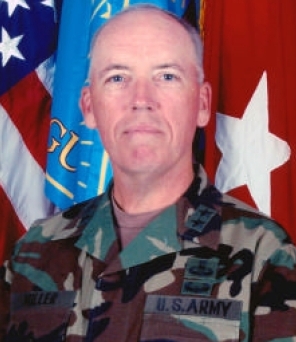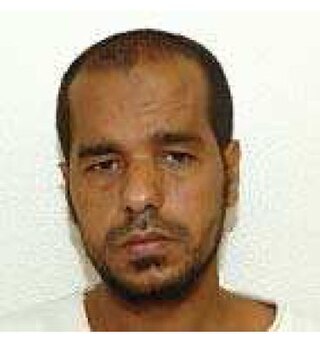Related Research Articles

Abu Ghraib prison was a prison complex in Abu Ghraib, Iraq, located 32 kilometers (20 mi) west of Baghdad. Abu Ghraib prison was opened in the 1950s and served as a maximum-security prison. From the 1970s, the prison was used by Saddam Hussein to hold political prisoners and later the United States to hold Iraqi prisoners. It developed a reputation for torture and extrajudicial killing, and was closed in 2014.

Charles A. Graner Jr. is an American former soldier who was court-martialed for prisoner abuse after the 2003–2004 Abu Ghraib prisoner abuse scandal. Along with other soldiers of his Army Reserve unit, the 372nd Military Police Company, Graner was accused of allowing and inflicting sexual, physical, and psychological abuse on Iraqi detainees in Abu Ghraib prison, a notorious prison in Baghdad during the United States' occupation of Iraq.

During the early stages of the Iraq War, members of the United States Army and the Central Intelligence Agency committed a series of human rights violations and war crimes against detainees in the Abu Ghraib prison in Iraq, including physical abuse, sexual humiliation, physical and psychological torture, and rape, as well as the killing of Manadel al-Jamadi and the desecration of his body. The abuses came to public attention with the publication of photographs of the abuse by CBS News in April 2004. The incidents caused shock and outrage, receiving widespread condemnation within the United States and internationally. The International Committee of the Red Cross reported that most of the detainees were civilians with no links to armed groups.

Geoffrey D. Miller is a retired United States Army major general who commanded the US detention facilities at Guantanamo Bay, Cuba, and Iraq. Detention facilities in Iraq under his command included Abu Ghraib prison, Camp Cropper, and Camp Bucca. He is noted for having trained soldiers in using torture, or "enhanced interrogation techniques" in US euphemism, and for carrying out the "First Special Interrogation Plan," signed by the Secretary of Defense, against a Guantanamo detainee.

Omar Ahmed Said Khadr is a Canadian who, at the age of 15, was detained by the United States at Guantanamo Bay for ten years, during which he pleaded guilty to the murder of U.S. Army Sergeant 1st Class Christopher Speer and other charges. He later appealed his conviction, claiming that he falsely pleaded guilty so that he could return to Canada where he remained in custody for three additional years. Khadr sued the Canadian government for infringing his rights under the Charter of Rights and Freedoms; this lawsuit was settled in 2017 with a CA$10.5 million payment and an apology by the federal government.

In 2005, The New York Times obtained a 2,000-page United States Army investigatory report concerning the homicides of two unarmed civilian Afghan prisoners by U.S. military personnel in December 2002 at the Bagram Theater Internment Facility in Bagram, Afghanistan and general treatment of prisoners. The two prisoners, Habibullah and Dilawar, were repeatedly chained to the ceiling and beaten, resulting in their deaths. Military coroners ruled that both the prisoners' deaths were homicides. Autopsies revealed severe trauma to both prisoners' legs, describing the trauma as comparable to being run over by a bus. Seven soldiers were charged in 2005.

The United Nations Stabilisation Mission in Haiti, also known as MINUSTAH, an acronym of its French name, was a UN peacekeeping mission in Haiti from 2004 to 2017. It was composed of 2,366 military personnel and 2,533 police, supported by international civilian personnel, a local civilian staff, and United Nations Volunteers. The mission's military component was led by the Brazilian Army and commanded by a Brazilian.

Salim Ahmed Salim Hamdan is a Yemeni man, captured during the invasion of Afghanistan, declared by the United States government to be an illegal enemy combatant and held as a detainee at Guantanamo Bay from 2002 to November 2008. He admits to being Osama bin Laden's personal driver and said he needed the money.
Jumah Mohammed Abdul Latif Al Dossari is a Bahraini citizen who was held for five years at Camp Delta, at the US Naval base at Guantanamo Bay. He spent 3+1⁄2 years in solitary confinement. He was released to Saudi Arabia in 2007 with no charges against him. During the 1990s, he fought in Bosnia and Chechnya.
The Office for the Administrative Review of the Detention of Enemy Combatants, established in 2004 by the Bush administration's Deputy Secretary of Defense Paul Wolfowitz, is a United States military body responsible for organising Combatant Status Review Tribunals (CSRT) for captives held in extrajudicial detention at the Guantanamo Bay detention camps in Cuba and annual Administrative Review Boards to review the threat level posed by deemed enemy combatants in order to make recommendations as to whether the U.S. needs to continue to hold them captive.
Specialist Tony Lagouranis is a former United States Army soldier, best known for having participated in torture as an interrogator during the occupation of Iraq. He was featured in the 2008 Academy Award-winning documentary Taxi to the Dark Side.

Charles D. Swift is an American attorney and former career Navy officer, who retired in 2007 as a Lieutenant Commander in the Judge Advocate General's Corps. He is most noted for having served as defense counsel for Salim Ahmed Hamdan, a detainee from Yemen who was the first to be charged at Guantanamo Bay; Swift took his case to the US Supreme Court. In 2005 and June 2006, the National Law Journal recognized Swift as one of the top lawyers nationally because of his work on behalf of justice for the detainees.
Starting in 2002, the American government detained 22 Uyghurs in the Guantanamo Bay detainment camp. The last 3 Uyghur detainees, Yusef Abbas, Hajiakbar Abdulghupur and Saidullah Khali, were released from Guantanamo on December 29, 2013, and later transferred to Slovakia.
Ahmed Mohammed Ahmed Haza al-Darbi is a citizen of Saudi Arabia who was held in the United States Guantanamo Bay detainment camps, in Cuba from August 2002 to May 2018; in May 2018, he was transferred to Saudi Arabia's custody. He was the only detainee held at Guantanamo released during President Donald Trump's administration.
The Center for Constitutional Rights has coordinated efforts by American lawyers to handle the habeas corpus, and other legal appeals, of several hundred of the Guantanamo detainees.
Abdul Wahid was a citizen of Afghanistan whose autopsy was held in the United States's Bagram Theater detention facility. He was beaten to death on November 6, 2003.
Colby Vokey is an American lawyer and former officer in the United States Marine Corps. He currently practices criminal defense law in his own private practice. He represents clients in all types of criminal matters, with particular emphasis on cases involving military law. Vokey earned the rank of lieutenant colonel and served as a judge advocate in the United States Marine Corps during 21 years of service to his country. His retirement from the Marine Corps became effective November 1, 2008. During his military career, Vokey earned worldwide praise for his work ethic and integrity, based in part on his work for defendants detained at Guantanamo Bay, Cuba, who faced charges stemming from the war in Iraq.

United States v. Mohamed Jawad is one of the military commissions convened under the authority of the Military Commissions Act of 2006.
A number of incidents stemming from the September 11 attacks have raised questions about legality.
The Pakistan lobby in the United States are the professional lobbyists paid directly by the government of Pakistan to lobby the public and government of the United States on behalf of Pakistani interests and/or on behalf of Pakistani American rights and interests.
References
- ↑ U.S. Military Lawyer. Retrieved on 2007-07-02
- ↑ Intel specialist pleads guilty to Iraq abuse, Associated Press, 2004-09-11. Retrieved on 2007-07-02